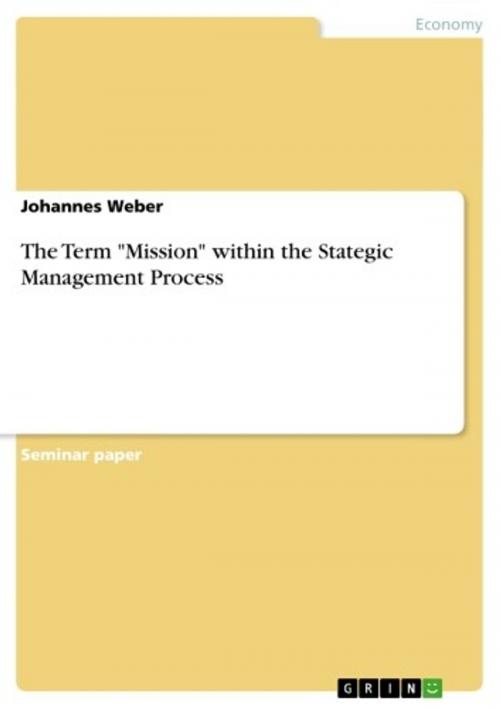The Term 'Mission' within the Stategic Management Process
Business & Finance, Management & Leadership, Management| Author: | Johannes Weber | ISBN: | 9783638622929 |
| Publisher: | GRIN Publishing | Publication: | March 8, 2007 |
| Imprint: | GRIN Publishing | Language: | English |
| Author: | Johannes Weber |
| ISBN: | 9783638622929 |
| Publisher: | GRIN Publishing |
| Publication: | March 8, 2007 |
| Imprint: | GRIN Publishing |
| Language: | English |
Seminar paper from the year 2005 in the subject Business economics - Business Management, Corporate Governance, grade: 1,0, University of Hull, course: STRATEGIC MANAGEMENT, 20 entries in the bibliography, language: English, abstract: Influenced by a growing number of acting companies, the world of nowadays business gets more and more integrated and enlaced with an increasing level of both national and global competition. Hence, gaining advantage over main rivals within a certain industry gets more important and makes many managers of modern-day companies thinking about ways to achieve this benefit. Whereas a lot of management members tend to focus on obvious solutions like cost reduction or promotional activities for instance, there are only a few so far who concentrate also on their firm's mission as primary key to success. Mission, described as the 'fundamental, unique purpose that sets' a certain organisation 'apart from other firms of its type and that identifies the scope of its operations in products and in market terms' (Pearce, 1981), can act as an effective tool to achieve success if it is used and structured correctly. According to Campbell, however, managing this important purpose 'is still a relatively uncharted area of management' and a lot of managers seem to not understand the 'nature and importance of mission while others fail to consider it at all' (Campbell and Yeung, 2002, 284). Even if there are different opinions about the meaning of mission, many authors of management textbooks are of the same opinion that companies should include statements of their raison d'etre, their reason of existence, in the corporate planning process. This process, seen as 'an identifiable flow of information through interrelated stages of analysis directed towards the achievement of an objective' (Pearce, 1981) is a dynamic system as companies often face incessant environment changes. Especially since budget-orientated planning mechanisms or forecast-based methods are seen to be insufficient to ascertain long-term survival and prosperity of corporations, it is vital that they conduct efficient strategic planning (Bradford et al., 2004). Regarding the process and the position of mission within it, you find several authors who advocate the position right at the beginning of Strategic Management whereas there are also theorists who see mission as a subsequent part or even as an output of it. This subject matter will be discussed in the next chapter followed by the topic of the role played by missions within the planning process of organisations. [...]
Seminar paper from the year 2005 in the subject Business economics - Business Management, Corporate Governance, grade: 1,0, University of Hull, course: STRATEGIC MANAGEMENT, 20 entries in the bibliography, language: English, abstract: Influenced by a growing number of acting companies, the world of nowadays business gets more and more integrated and enlaced with an increasing level of both national and global competition. Hence, gaining advantage over main rivals within a certain industry gets more important and makes many managers of modern-day companies thinking about ways to achieve this benefit. Whereas a lot of management members tend to focus on obvious solutions like cost reduction or promotional activities for instance, there are only a few so far who concentrate also on their firm's mission as primary key to success. Mission, described as the 'fundamental, unique purpose that sets' a certain organisation 'apart from other firms of its type and that identifies the scope of its operations in products and in market terms' (Pearce, 1981), can act as an effective tool to achieve success if it is used and structured correctly. According to Campbell, however, managing this important purpose 'is still a relatively uncharted area of management' and a lot of managers seem to not understand the 'nature and importance of mission while others fail to consider it at all' (Campbell and Yeung, 2002, 284). Even if there are different opinions about the meaning of mission, many authors of management textbooks are of the same opinion that companies should include statements of their raison d'etre, their reason of existence, in the corporate planning process. This process, seen as 'an identifiable flow of information through interrelated stages of analysis directed towards the achievement of an objective' (Pearce, 1981) is a dynamic system as companies often face incessant environment changes. Especially since budget-orientated planning mechanisms or forecast-based methods are seen to be insufficient to ascertain long-term survival and prosperity of corporations, it is vital that they conduct efficient strategic planning (Bradford et al., 2004). Regarding the process and the position of mission within it, you find several authors who advocate the position right at the beginning of Strategic Management whereas there are also theorists who see mission as a subsequent part or even as an output of it. This subject matter will be discussed in the next chapter followed by the topic of the role played by missions within the planning process of organisations. [...]















